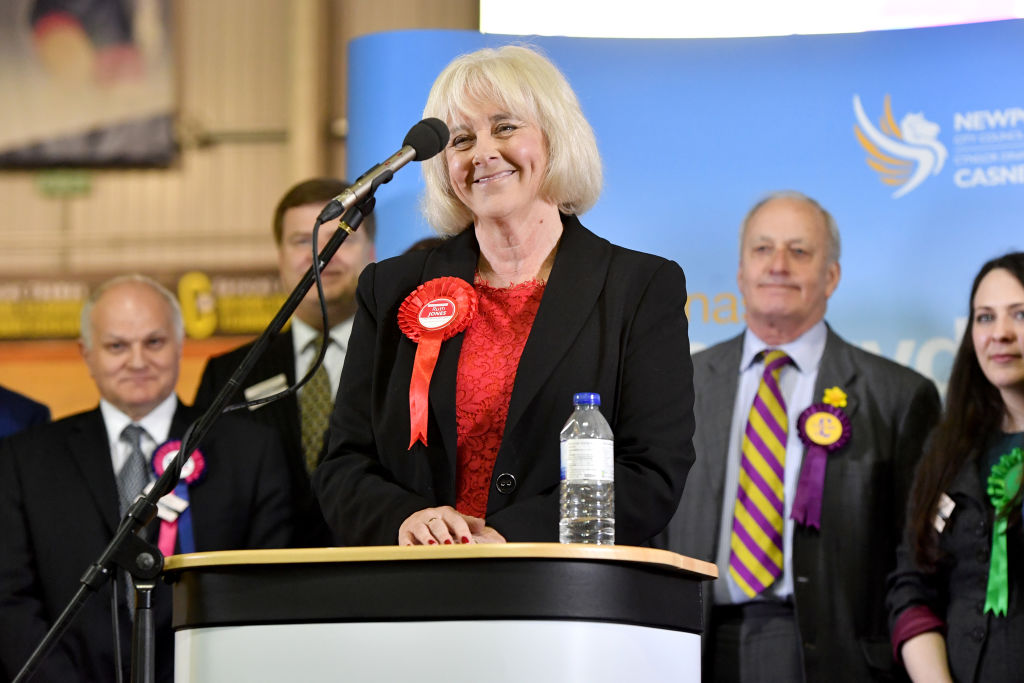The result from the Newport West by-election came in late last night and as was generally expected Labour held the seat, albeit with a reduced majority. As had also been expected, turnout was significantly down on the general election. Here is the full result:
| Candidate (Party) | Votes | per cent (change on 2017) |
| Ruth Jones (Labour) | 9,308 | 39.6 (-12.7) |
| Matthew Evans (Conservative) | 7,357 | 31.3 (-8.0) |
| Neil Hamilton (UKIP) | 2,023 | 8.6 (+6.1) |
| Jonathan Clark (Plaid Cymru) | 1,185 | 5.0 (+2.5) |
| Ryan Jones (Lib-Dems) | 1,088 | 4.6 (+2.4) |
| Amelia Womack (Greens) | 924 | 3.9 (+2.9) |
| June Davies (Renew) | 879 | 3.7 (+3.7) |
| Richard Suchorzewski (Abolish the Assembly) | 205 | 0.9 (+0.9) |
| Ian McLean (Social Democrat) | 202 | 0.9 (+0.9) |
| Phillip Taylor (Democrats and Veterans) | 185 | 0.8 (+0.8) |
| Hugh Nicklin (For Britain) | 159 | 0.7 (+0.7) |
Turnout: 37.1 per cent
Majority: 1,951
Swing: 2.4 per cent Labour to Conservative
A first notable thing about the result is the turnout figure. At 37.1 per cent, the official turnout was far from an all-time low for UK parliamentary by-elections. But it was also clearly a little ‘below trend’. Given the 67.5 per cent Newport West turnout in 2017, we should have been looking at a turnout figure in the mid-40s. Of course there are legitimate excuses: we can point to factors like Brexit monopolising nearly all political attention, as well as to the rather horrible weather on the day itself, to help explain low participation. One conclusion does seem clear though: the current political crisis did not mobilise angry voters to take part. In fact, the opposite might be true: if anything, people seem to have been alienated from participating in the electoral process.
As far as the parties are concerned, the by-election produced the Labour victory that it always should have done. They have held the seat since 1987, and this was a mid-term by-election that saw them fighting against a deeply unpopular Westminster government that has been failing to deliver on its central policy objective. Even with the loss of any personal vote that Paul Flynn had, of course Labour should have won. They did so comfortably enough. But this was hardly an outstanding result for the party. At this stage in a parliament, against a government as troubled as that of Theresa May, there really should not be a swing from Labour to the Conservatives, however small. This result does not look like the sort of outcome you would expect from a main opposition party that was on course for a general election victory.
The Conservatives had a strong local candidate, but Matthew Evans was always battling against the odds. In normal times the candidate of an unpopular government would not expect, during a mid-term election, to have much of a chance coming from behind in a by-election – and that is just how it turned out. At least some of the old rules of normal politics, it seems, do still apply. In these circumstances, his strong second place was a very creditable result.
Putting together the results of the two main parties, we see a big fall in their dominance. This has been a feature of recent opinion polls, both Britain-wide and in Wales. After the 2017 general election saw the largest two-party vote share since 1970, recent months have witnessed a steady erosion of support for both the Tories and Labour. Newport West showed an even larger fall than the polls have recently been suggesting. This may in part have been down to the sheer number of candidates – voters did not exactly lack for alternatives to the old duopoly. But the by-election result reinforced the sense that the resurgence of two-party politics in 2017 may already be in significant decline.
Ukip were a clear third, but a long way behind the Tories: talk of them pressing for second place turned out to be a long way short of the reality. Nonetheless, their improved showing on 2017 was in line with what recent polls have suggested. Much though many people might dislike it, the party in its post-Farage incarnation is currently experiencing a modest resurgence in support.
Of the other parties, there were respectable showings for Plaid Cymru, the Liberal Democrats, and the Greens in a seat where they had little 2017 vote to build on.
Parliamentary by-election results can often by over-interpreted. The fact that, in a seat which voted Leave in June 2016, a Labour candidate who had backed a second referendum was able to win, probably means less than some would like it to mean; I do not think that this result can, in isolation at least, legitimately be taken to indicate very much about public attitudes to Brexit. Perhaps the most important thing, in a week that has seen parliamentary votes decided by a margin of one, or even by the Speaker’s casting vote, is that Newport West simply has an MP again. And her vote in the House of Commons may well matter quite a lot in the next few days and weeks of these extraordinary political times.






Comments